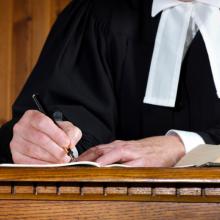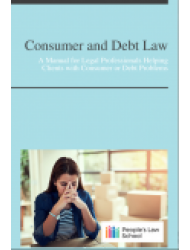Legal research means finding and double-checking the info and laws you need to understand your case. The main sources for this are laws (like statutes and constitutions) and other legal documents.
Useful resources

Download professional practice checklists on eight areas of law from the Law Society of BC website.
View resource →
A guide to finding court records and transcripts relating to a case.
View resource →
Learn how to quickly evaluate online sources of legal information for accuracy and credibility.
Read more →
How to navigate and best use resources. Non-BC, example of a contextual guide on which resources to use.
View resource →
How to help clients recognize and identify legal problems. Non-BC, example of a guide to helping clients recognize they have a legal problem.
View resource →
A key resource for advocates and other legal professional helping clients with consumer or debt problems.
View resource →Other organizations that can help
Current BC laws and regulations are now freely available online at BC Laws.
The new website is managed by the King’s Printer, in partnership with the Ministry of Justice, the Law Society of British Columbia, and the Law Foundation of British Columbia.
Information and guidebooks about civil, family, and criminal law. Includes links to court forms and court locations in BC.
Local contacts and referral lists. Connects people to community, health, and government resources for help.
How to create legal information materials for clients. Best practices and other tools to help you produce information your audience trusts, understands, and uses.
The Canadian Legal Information Institute (CanLII) provides access to court judgements from all Canadian courts and the consolidated statutes and regulations of every jurisdiction in Canada.
Based in Alberta, but provides information on how to navigate and best use resources for a wide variety of legal topics.
The Civil Resolution Tribunal is Canada’s first online tribunal and is part of the BC public justice system. It offers an accessible, affordable way to resolve many types of civil law disputes, including for small claims less than $5,000, strata, motor vehicle accidents/injuries, and more, without needing a lawyer or attending court.
Provides links to legal information, education, and help for British Columbians on various topics including civil, criminal, family, tenancy, employment, and wills and estates planning.
Locate services and resources in your community who can help with legal problems.
Clicklaw Wikibooks are collaboratively developed, plain language legal publications that are published and kept up-to-date on a wiki, where they can also be printed. More than 50 legal professionals and law-related, non-profit organizations contribute to the Clicklaw Wikibooks collection.
Free legal information that’s easy to understand. Based in Ontario, but includes publications and other resources that help people recognize and identify legal problems.
Analytical articles on various types of law, news from the legal community, information about recent court decisions, and more.
Court Services Online is British Columbia’s electronic court registry. Look up of court record information and documents including appearances and decisions for civil, traffic/criminal, and appeals.
Provides legal information services to the legal community and the public via a network of libraries in BC courthouses. Visit the website and learn how the libraries provide access to staff expertise, print and digital legal collections, and public computers. You’re encouraged to call or email before visiting as they can provide many services this way which can save you time.
Online legal information website
On Courthouse Libraries BC’s website, Our Legal Knowledge Base is a collection of handy references and hard-to-find answers to a diverse assortment of legal research questions.
Legal information on a variety of topics in plain language.
Use this guide to help your clients find services. The Red Book Online is a comprehensive guide to over 4,000 community, social, and government agencies in BC. The agencies offer a wide range of services, including counselling, housing, health, education, and transportation.
Help finding court records and transcripts relating to a case.
The Solution Explorer is the first step in the CRT claims process. It asks you simple questions and gives you customized legal information and options based on your answers. Its self-help tools, like communication templates, might help you resolve your issue on your own.
Using the Solution Explorer is free and anonymous.
Issues covered:
- Intimate Images
- Motor Vehicle Accidents
- Small Claims up to $5,000
- Strata Property
- BC Societies, Housing and Community Service Cooperatives